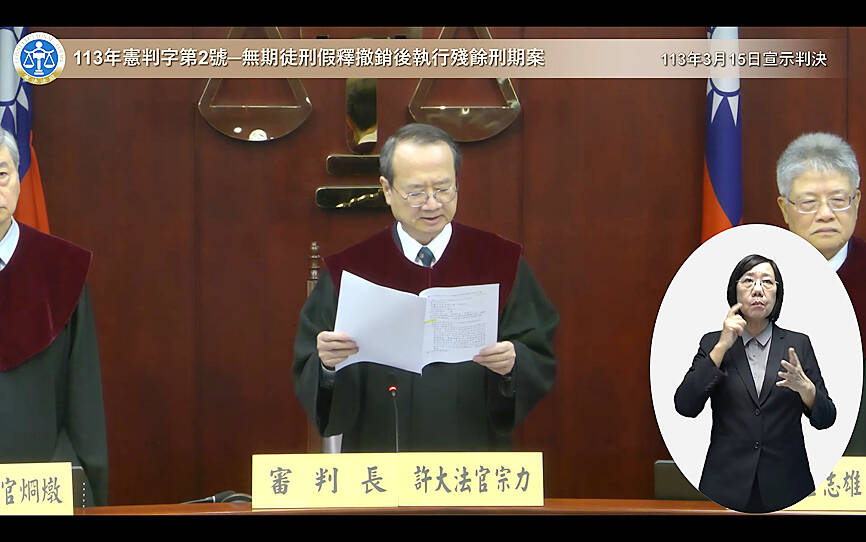A Criminal Code provision requiring repeat offenders to serve up to 25 years with no chance of parole if they violate the law during their parole contravenes the Constitution, and should be amended within two years, the Constitutional Court said yesterday.
Hsieh Chao-he (謝朝和), who was sentenced to life in prison for violating the now-defunct Act Punishing Thievery and Banditry (懲治盜匪條例), was in 2009 granted parole after serving 18 years.
However, his parole was revoked after he was convicted of theft and ordered to serve 25 years in jail without parole. Hsieh said the sentence was “disproportionate” to the crime and requested a constitutional interpretation.

Photo: screen shot from a Constitutional Court livestream
Another 35 similar cases were merged into one in the Constitutional Court’s review of Hsieh’s request.
The Constitutional Court yesterday said that the revocation of the accused’s parole had not considered the severity of the repeat offense nor the effects of the rehabilitation program on the accused during the time of parole.
Ordering the accused to serve out the remainder of their previous sentence before their parole for up to 25 years violates the principle of proportionality and fails to observe the spirit of Article 8 of the Constitution, the court said.
The competent authority should amend this provision in the Criminal Code within two years, it said.
If the law is not amended within the given period, the competent authority should rescind rulings and instead implement measures more in line with the principle of proportionality, it said.
Five appeals were certified to have contravened the Constitution and have been remanded to the Supreme Court, it said, adding that chief prosecutors are within their rights or can act if petitioned by others to lodge an extraordinary appeal on the ruling.
The Supreme Court should halt legal proceedings of the cases until the amendment is passed and then review the case with the amended Criminal Code in mind, it added.
As for other convicts facing a similar situation, but who were not part of the five appeals, the Constitutional Court said that if they voice opposition regarding their cases following the constitutional interpretation or if their cases are on trial, the courts presiding over the cases should halt all legal proceedings until the amendment has been promulgated.

‘WIN-WIN’: The Philippines, and central and eastern European countries are important potential drone cooperation partners, Minister of Foreign Affairs Lin Chia-lung said Minister of Foreign Affairs Lin Chia-lung (林佳龍) in an interview published yesterday confirmed that there are joint ventures between Taiwan and Poland in the drone industry. Lin made the remark in an exclusive interview with the Chinese-language Liberty Times (the Taipei Times’ sister paper). The government-backed Taiwan Excellence Drone International Business Opportunities Alliance and the Polish Chamber of Unmanned Systems on Wednesday last week signed a memorandum of understanding in Poland to develop a “non-China” supply chain for drones and work together on key technologies. Asked if Taiwan prioritized Poland among central and eastern European countries in drone collaboration, Lin

The Chien Feng IV (勁蜂, Mighty Hornet) loitering munition is on track to enter flight tests next month in connection with potential adoption by Taiwanese and US armed forces, a government source said yesterday. The kamikaze drone, which boasts a range of 1,000km, debuted at the Taipei Aerospace and Defense Technology Exhibition in September, the official said on condition of anonymity. The Chungshan Institute of Science and Technology and US-based Kratos Defense jointly developed the platform by leveraging the engine and airframe of the latter’s MQM-178 Firejet target drone, they said. The uncrewed aerial vehicle is designed to utilize an artificial intelligence computer

Renewed border fighting between Thailand and Cambodia showed no signs of abating yesterday, leaving hundreds of thousands of displaced people in both countries living in strained conditions as more flooded into temporary shelters. Reporters on the Thai side of the border heard sounds of outgoing, indirect fire yesterday. About 400,000 people have been evacuated from affected areas in Thailand and about 700 schools closed while fighting was ongoing in four border provinces, said Thai Rear Admiral Surasant Kongsiri, a spokesman for the military. Cambodia evacuated more than 127,000 villagers and closed hundreds of schools, the Thai Ministry of Defense said. Thailand’s military announced that

CABINET APPROVAL: People seeking assisted reproduction must be assessed to determine whether they would be adequate parents, the planned changes say Proposed amendments to the Assisted Reproduction Act (人工生殖法) advanced yesterday by the Executive Yuan would grant married lesbian couples and single women access to legal assisted reproductive services. The proposed revisions are “based on the fundamental principle of respecting women’s reproductive autonomy,” Cabinet spokesperson Michelle Lee (李慧芝) quoted Vice Premier Cheng Li-chiun (鄭麗君), who presided over a Cabinet meeting earlier yesterday, as saying at the briefing. The draft amendment would be submitted to the legislature for review. The Ministry of Health and Welfare, which proposed the amendments, said that experts on children’s rights, gender equality, law and medicine attended cross-disciplinary meetings, adding that